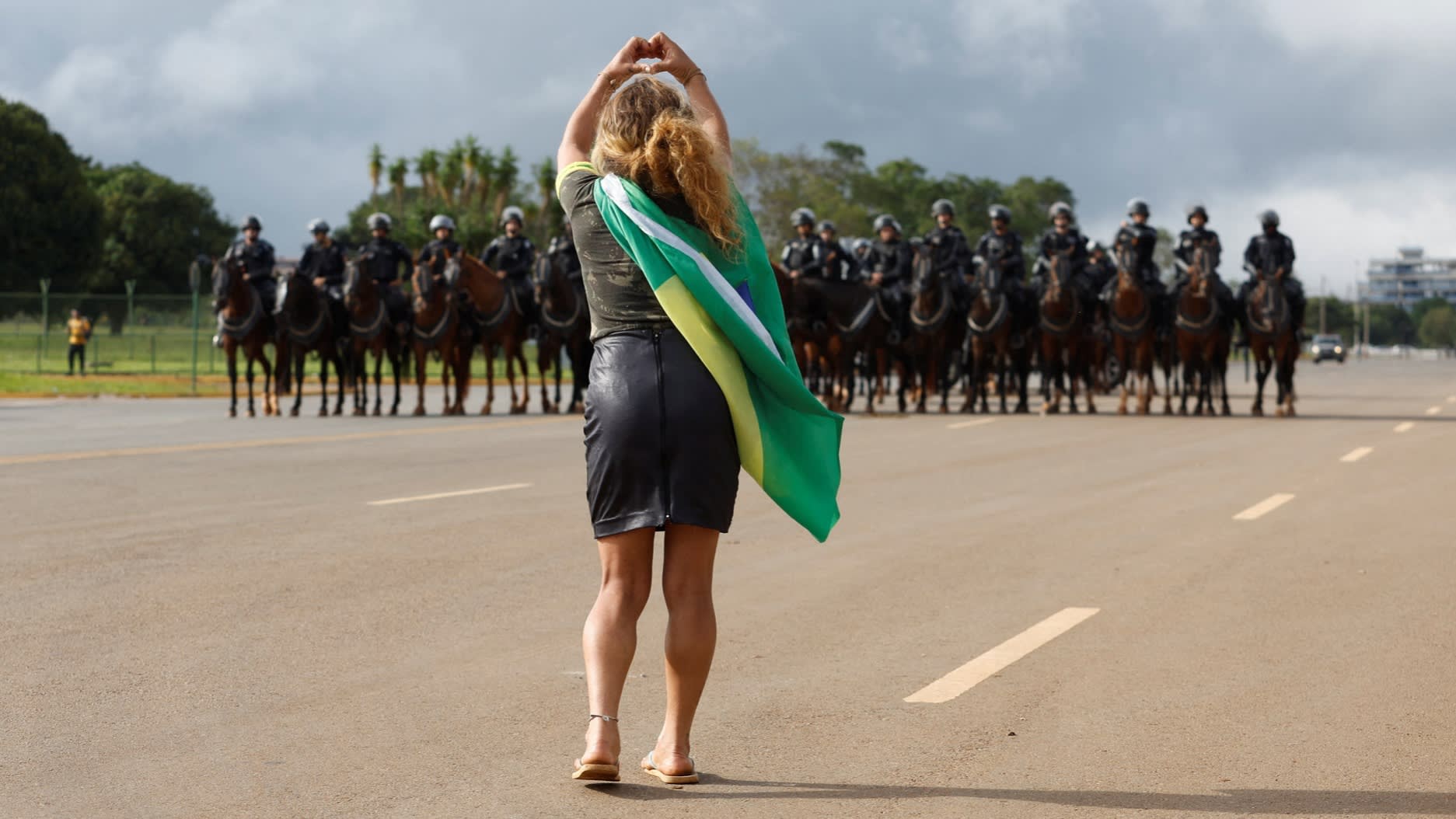Joe Biden condemned violent riots in Brazil as the White House faced calls from Congress to expel Jair Bolsonaro, the Latin American country’s former president, from the US, where he has been staying since leaving office.
“Canada, Mexico, and the United States condemn the January 8 attacks on Brazil’s democracy and on the peaceful transfer of power,” the US president said in a joint statement on Monday with Mexico’s leader, Andrés Manuel López Obrador, and Canada’s prime minister, Justin Trudeau.
They added: “We stand with Brazil as it safeguards its democratic institutions. Our governments support the free will of the people of Brazil.”
Bolsonaro, who faces investigations from his time as president, has been staying in self-imposed exile in Florida for about two weeks. He was admitted to hospital for observation due to “abdominal discomfort”, his wife, Michelle, posted on social media on Monday. “We are praying for his health and for Brazil.”
Several Democratic lawmakers have called for the former Brazilian president to be removed from the US. The questions come after his supporters on Sunday raided the country’s Congress, supreme court and presidential palace in riots that bore a striking resemblance to the storming of the US Capitol on January 6 2021.
“The US should not be a refuge for this authoritarian who has inspired domestic terrorism in Brazil,” Democratic Congressman Joaquin Castro said on CNN. “He should be sent back to Brazil.”
Prominent progressive lawmaker Alexandria Ocasio-Cortez also called for Bolsonaro to be returned to Brazil. “We must stand in solidarity with @LulaOficial’s democratically elected government,” she wrote on Twitter on Sunday, referring to the country’s president Luiz Inácio Lula da Silva. “The US must cease granting refuge to Bolsonaro in Florida.”
Republicans have not joined calls for Bolsonaro’s deportation, although a handful have condemned the protests, including Florida senator Rick Scott and the disgraced Republican congressman George Santos, whose parents were born in Brazil.
Brazilian politicians on Monday also joined calls to bring Bolsonaro back to the country. Renan Calheiros, a prominent senator, asked Brazil’s supreme court for the “immediate” extradition of the former president, saying his involvement in the riots on Sunday was “undeniable”.
The court will consider the request, which called for Bolsonaro to be returned to Brazil within 72 hours.
National security adviser Jake Sullivan said the US had not received any official requests from Brazil’s government about Bolsonaro’s status in the country.
“If and when we do, we’ll deal with it,” he said.
He declined to speak about Bolsonaro’s specific immigration status, citing a policy of avoiding specifics about individual visa cases.
Sullivan said he expects Biden will speak with Lula in the coming days.
On Sunday evening Bolsonaro had tried to distance himself from radical supporters. The former army captain said the attacks, which damaged government property and artwork, had “crossed the line”.
While the US State Department declined to comment specifically on Bolsonaro’s visa or his status in the US, spokesman Ned Price said Monday that foreign leaders or diplomats who have entered the country on a diplomatic visa known as an A visa have 30 days to leave the US or seek an updated visa if they are no longer conducting official business.
“If an A visa holder is no longer engaged in official business on behalf of their government, it is incumbent on that visa holder to depart the US or to request a change to another immigration status within 30 days,” Price said.
“If an individual has no basis on which to be in the United States, an individual is subject to removal by the Department of Homeland Security,” he added.
A former senior US official who worked on immigration issues said Bolsonaro probably travelled to the US on an existing visa, which may have been for diplomatic or tourism purposes.
He argued it would not be straightforward for the US government to remove Bolsonaro. “It is not easy legally to remove somebody from the US who’s not willing to go. They often have significant protection once they are physically in the US,.”
He added that it could be possible for Bolsonaro to remain in the country in a new capacity, for instance if he found other employment.
In any case, any removal action “could be a protracted, multiyear effort”, the former official said. “It would not be a rapid process.”
Under US immigration laws, an individual may be deported if the secretary of state finds them to be harmful to US foreign policy. “The question is whether the secretary of state is going to do that,” he said.
Additional reporting by Michael Pooler
